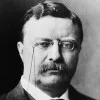Wisdom is publicly rejected, affairs are pursued with force,
A good speaker is spurned, and the wretched warrior is loved.
Men strive not with educated speeches but instead with insults
attack one another and enter into mutual enmity.
They seize property suddenly not by the right of law but with swords
As they seek sovereignty and wander with the power of the mob.[Pellitur e medio sapientia, vi geritur res,
spernitur orator bonus, horridus miles amatur.
haut doctis dictis certantes nec maledictis
miscent inter sese inimicitiam agitantes,
non ex iure manum consertum, sed magis ferro
rem repetunt regnumque petunt, vadunt solida vi.]Ennius (239-169 BC) Roman poet, writer [Quintus Ennius]
Annales, Book 8, Sec. 3, l. 262-8
(Source)
On public discourse during wars. Fragment quoted by Cicero in Epistle 171.
Alt. trans.: "Pushed away from the centre good sense, force rules the day, / despised the good orator, the horrid soldier cherished. / Fighting, not with learned words or curses, / they clash with one another, pushing hostilities, / laying hand onto one another not rightfully, but rather with the sword / they seek material gain and strive for power, advancing with brute force."
Quotations about:
public affairs
Note not all quotations have been tagged, so Search may find additional quotes on this topic.
A democracy is badly served when newspapers and television focus so intensely on the personal joys and tragedies of famous people. This kind of “news” crowds out more serious issues, and there is an important difference — as the Constitution’s framers well knew, and as many people today appear to have forgotten — between the public interest and what interests the public.
Even the protective functions of the state are most important for those in the lower income brackets. Lethal serum and poison drugs do, one gathers, work rather democratically on rich and poor alike. But many of us could probably survive a certain amount of exploitation in our prescriptions, fraud in our food packaging, mendacity in our dental advertising, or thimblerigging in our securities. We live in parts of cities where epidemics are less likely. The family that struggles to make ends meet, the widow with life-insurance money around loose, the dwellers in urban tenements need the protection of an alert FTC, FDA, SEC, and Public Health Service.
In our age there is no such thing as “keeping out of politics.” All issues are political issues, and politics itself is a mass of lies, evasions, folly, hatred, and schizophrenia.
George Orwell (1903-1950) English writer [pseud. of Eric Arthur Blair]
Essay (1946-04), “Politics and the English Language,” Horizon Magazine
(Source)
All men in whose character there is not an element of hardened baseness must admit the need in our public life of those qualities which we somewhat vaguely group together when we speak of “reform,” and all men of sound mind must also admit the need of efficiency.
There are, of course, men of such low moral type, or of such ingrained cynicism, that they do not believe in the possibility of making anything better, or do not care to see things better. There are also men who are slightly disordered mentally, or who are cursed with a moral twist which makes them champion reforms less from a desire to do good to others than as a kind of tribute to their own righteousness, for the sake of emphasizing their own superiority. From neither of these classes can we get any real help in the unending struggle for righteousness.
There remains the great body of the people, including the entire body of those through whom the salvation of the people must ultimately be worked out. All these men combine or seek to combine in varying degrees the quality of striving after the ideal, that is, the quality which makes men reformers, and the quality of so striving through practical methods — the quality which makes men efficient. Both qualities are absolutely essential. The absence of either makes the presence of the other worthless or worse.
POLITICS, n. A strife of interests masquerading as a contest of principles. The conduct of public affairs for private advantage.
Ambrose Bierce (1842-1914?) American writer and journalist
“Politics,” The Devil’s Dictionary (1911)
(Source)
Originally published in the "Cynic's Word Book" column in the New York American (1906-03-16), and the "Cynic's Dictionary" column in the San Francisco Examiner (1906-03-21).
The word “idiot” comes from a Greek root meaning private person. Idiocy is the female defect: intent on their private lives, women follow their fate through a darkness deep as that cast by malformed cells in the brain. It is no worse than the male defect, which is lunacy: men are so obsessed by public affairs that they see the world as by moonlight, which shows the outlines of every object but not the details indicative of their nature.
Rebecca West (1892-1983) British author, journalist, literary critic, travel writer [pseud. for Cicily Isabel Fairfield]
Black Lamb and Grey Falcon, Prologue (1941)
(Source)
Sometimes oddly paraphrased, "The main difference between men and women is that men are lunatics and women are idiots."








